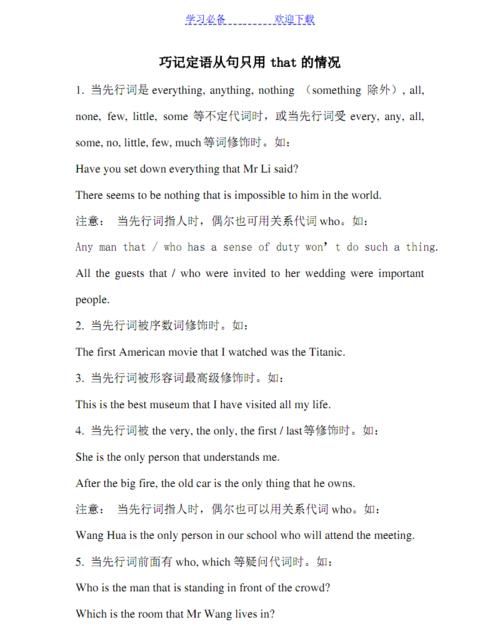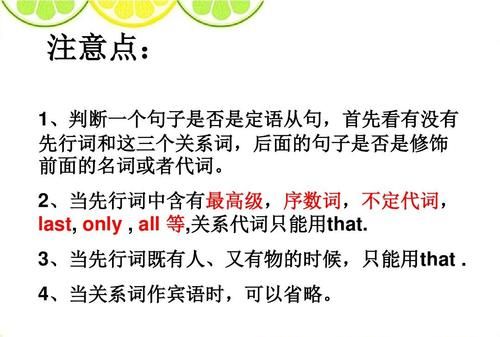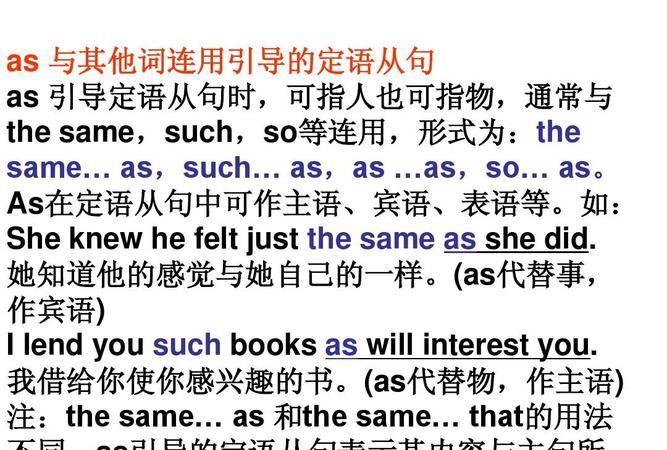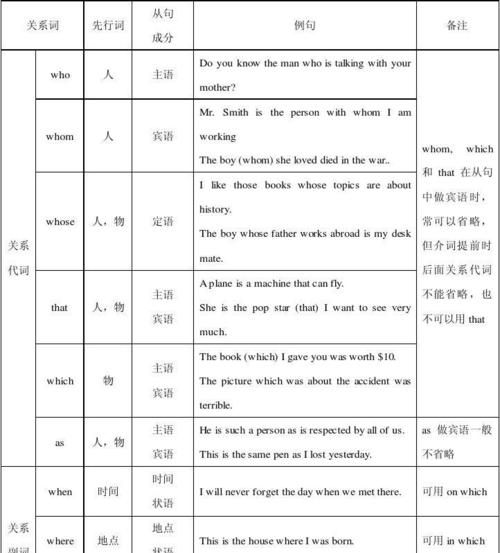本文目录
定语从句关系词能做哪些成分
一、定语从句的引导词有关系代词who,whom,whose,which,that,as;关系副词when,where,why.定语从句中引导词的选用主要看先行词在定语从句中作什么成分或者是定语从句中缺什么成分.1.定语从句中缺主语,修饰人时用who ...

非限定定语从句修饰句子
以下就是我整理的定语从句修饰句子,一起来看看吧!
一、定语从句及相关术语
1.定语从句:修饰一个名词或代词的从句称为定语从句,一般紧跟在它所修饰的先行词后面。
2.关系词:引导定语从句的.关联词成为关系词
关系词有关系代词和关系副词。关系代词有that, which, who, whom, whose, as 等; 关系副词有where, when, why等。
关系词常有3个作用:1,引导定语从句。2,代替先行词。3,在定语从句中担当一个成分。
二.关系代词引导的定语从句
1.who指人,在从句中做主语
(1) The boys who are playing football are from Class One.
(2) Yesterday I helped an old man who lost his way.
2. whom指人,在定语从句中充当宾语,常可省略。
(1) Mr. Liu is the person (whom) you talked about on the bus.
(2) Mr. Ling is just the boy whom I want to see.
注意:关系代词whom在口语和非正式语体中常用who代替,可省略。
(3) The man who/whom you met just now is my friend.
3. which指物,在定语从句中做主语或者宾语,做宾语时可省略
(1) Football is a game which is liked by most boys.
(2) This is the pen (which) he bought yesterday.
4. that指人时,相当于who 或者whom;指物时,相当于which。在宾语从句中做主语或者宾语,做宾语时可省略。
(5) The number of the people that/who come to visit the city each year rises one million.
(6) Where is the man that/whom I saw this morning?
5. whose通常指人,也可指物,在定语从句中做定语
(1) He has a friend whose father is a doctor.
(2) I once lived in a house whose roof has fallen in.
whose指物时,常用以下结构来代替
(3) The classroom whose door is broken will soon be repaired.
(4) The classroom the door of which is broken will soon be repaired.
(5) Do you like the book whose cover is yellow?
(6) Do you like the book the color of which is yellow?
三.介词+关系代词引导的定语从句
关系代词在定语从句中做介词宾语时,从句常由介词+关系代词引导
(1) The school (that/which) he once studied in is very famous.
(2) The school in which he once studied is very famous.
(3) Tomorrow I will bring here a magazine (that/which) you asked for.
(4) Tomorrow I will bring here a magazine for which you asked.
(5) We'll go to hear the famous singer (whom/that/who) we have often talked about.
(6) We'll go to hear the famous singer about whom we have often talked.

限制性定语从句能修饰句子吗
定语从句如何修饰句子?许多人并不是很清楚了解,以下是我整理的相关资料,欢迎阅读。
定语从句
定语从句,一个简单句跟在一名词或代词后(先行词)进行修饰限定,就叫做定语从句。在主句中充当定语成分。被修饰的词叫先行词。定语从句不同于单词作定语的情况,它通常只能放在被修饰的词(即先行词)之后。
定语从句由关系词(关系代词、关系副词)引导,关系代词、关系副词位于定语从句句首。
定语从句如何修饰句子
1)who, whom,that
这些词代替的先行词是人的名词或代词,在从句中所起作用如下:
Is he the man who/that wants to see you?
他就是想见你的人吗?(who/that在从句中作主语) He is the man whom/ that I saw yesterday.
他就是我昨天见的那个人。(whom/that在从句中作宾语)
2) Whose 用来指人或物,(只用作定语, 若指物,它还可以同of which互换), 例如:
They rushed over to help the man whose car had broken down. 那人车坏了,大家都跑过去帮忙。
Please pass me the book whose (of which) cover is green. 请递给我那本绿皮的书。
3)which, that
它们所代替的先行词是事物的名词或代词,在从句中可作主语、宾语等,例如:
A prosperitywhich / thathad never been seen before appears in the countryside. 农村出现了前所未 有的繁荣。(which / that在句中作主语)
The packagewhich / thatyou are carrying is about to come unwrapped. 你拿的包快散了。(which / that 在句中作宾语)
关系副词引导的定语从句
关系副词可代替的先行词是时间、地点或理由的名词,在从句中作状语。
1)when, where, why
关系副词when, where, why的含义相当于"介词+ which"结构,因此常常和"介词+ which"结构交替使用,例 如:
There are occasions when (on which) one must yield. 任何人都有不得不屈服的时候。
Beijing is the place where (in which) I was born.北京是我的出生地。
Is this the reason why (for which) he refused our offer? 这就是他拒绝我们帮助他的理由吗?
2)that代替关系副词
that可以用于表示时间、地点、方式、理由的.名词后取代when, where, why和"介词+ which"引导的定语从 句,在非正式文体中that常被省略(正式文体中不可省略),例如:
His father died the year (that / when / in which) he was born. 他父亲在他出生那年逝世了。
He is unlikely to find the place (that / where / in which) he lived forty years ago. 他不大可能找到他四十 年前居住过的地方。
判断关系代词与关系副词
方法一: 用关系代词,还是关系副词完全取决于从句中的谓语动词。及物动词后面无宾语,就必须要 求用关系代词。例如:
(错) This is the mountain village where I visited last year.
(错) I will never forget the days when I spent in the countryside.
(对) This is the mountain village (which) I visited last year.
(对) I'll never forget the days (which) I spent in the countryside.
习惯上总把表地点或时间的名词与关系副词 where, when联系在一起。此两题错在关系词的误用上。
方法二: 准确判断先行词在定语从句中的成分(主、谓、宾、定、状),也能正确选择出关系代词/关系 副词.先行词在从句中作主、定、宾语时,应选择关系代词;先行词在从句中作状语时,应选 择关系副词。
例如:(对)Is this the museum which you visited a few days ago?
(对)Is this the museum where the exhibition was held?
【延伸阅读】
状语从句的定义
状语从句 (Adverbial Clause) 是指句子用作状语时,起副词作用的句子。状语从句可以修饰谓语、非谓语动词、定语、状语或整个句子。
状语从句根据其作用可分为时间、地点、原因、条件、目的、结果、让步、方式和比较等从句。状语从句一般由连词(从属连词)引导,也可以由词组引起。从句位于句首或句中时通常用逗号与主句隔开,位于句尾时可以不用逗号隔开。
状语从句的分类
1.时间状语从句
2.地点状语从句
3.原因状语从句
4.条件状语从句
5.目的状语从句
6.让步状语从句
7.比较状语从句
8.方式状语从句
9.结果状语从句
状语从句的时态特点
一般情况下,时间和条件状语从句的谓语动词一般用“一般现在时”表示“一般将来时”,用“现在完成时”表示“将来完成时”。例如:
I will call you as soon as I arrive in Beijing. 我到北京就将给你打电话。
(这是由as soon as引导的时间状语从句,从句中的谓语动词arrive是一般现在时,表示一般将来时,绝不可用will arrive)
As soon as I have finished this work, I will have gone home.如果我早点完成工作的话,我现在已经到家了。
(从句中的谓语动词用现在完成时have finished,表示将来完成时,绝不可用will have finished)
If he comes back, please let me know.如果他回来了,请通知我。
(从句中的谓语动词用comes back,表示一般将来时,绝不可用will come back)
从句通常结构:主 do sth.do sb.(条件)+ V.结果

定语从句引导词的用法
1、定语从句: 定语从句是由关系代词或关系副词引导的从句,其作用是作定语修饰主句的某个名词性成分,相当于形容词,所以又称为形容词性从句,一般紧跟在它所修饰的先行词后面.
2、关系词: 引导定语从句的关联词称为关系词,关系词有关系代词和关系副词.关系代词有that, which, who, whom, whose, as等;关系副词有where, when, why等.关系词常有3个作用:1,引导定语从句.2,代替先行词.3,在定语从句中担当一个成分.
3、定语: 定语用来限定、修饰名词或代词的,是对名词或代词起修饰、限定作用的词、短语或句子,汉语中常用‘……的’表示.主要由形容词担任.此外,名词,代词,数词,分词,副词,不定式以及介词短语也可以来担任,也可以由一个句子来担任.单词作定语时通常放在它所修饰的词之前,作前置定语.短语和从句作定语时则放在所修饰的词之后,作后置定语.
(一) 限定性定语从句
1. that既可代表事物也可代表人,which代表事物;它们在从句中作主语或宾语,that在从句中作宾语时常可省略关系词,which在从句中作宾语则不能省略.而且,如果which在从句中作“不及物动词+介词”的介词的.宾语,注意介词不要丢掉,而且介词总是放在关系代词which的前边,但有的则放在它原来的位置
2. which作宾语时,根据先行词与定语从句之间的语义关系,先行词与which之间的介词不能丢
3. 代表物时多用which,但在带有下列词的句子中用that而不用which,这些词包括当先行词是anything, everything, nothing ,few, all, none, little, some等不定代词时,或者是由every, any, all, some, no, little, few, much等修饰时等,这时的that常被省略 还有先行词前有序数词或形容词最高级修饰时,或先行词就是序数词或最高级时.以及先行词中既有人又有物时.还有句中前面有which时,都只能用that
4. who和whom引导的从句用来修饰人,分别作从句中的主语和宾语,whom作宾语时,要注意它可以作动词的宾语也可以作介词的宾语
5. where是关系副词,用来表示地点的定语从句
6. when引导定语从句表示时间〔注〕值得一提的是,表示时间“time"一词的定语从句只用when引导,有时不用任何关系代词,当然也不用that引导
By the time you arrive in London, we will have stayed there for two weeks. I still remember the first time I met her. Each time he goes to business trip, he brings a lot of living necessities, such as towers, soap, toothbrush etc.
7. whose是关系代词,修饰名词作定语,相当于所修饰成分的前置所有格.它引导的从句可以修饰人和物, 当它引导的从句修饰物体时, 可以与 of which 调换,表达的意思一样.
8. 当从句的逻辑主语是some, any, no, somebody, anybody, nobody, something, anything, everything或nothing时,常用there is来引导
There is somebody here who wants to speak to you. 这里有人要和你说话.
(二)非限定性定语从句
非限定性定语从句的作用是对所修饰的成分作进一步说明,通常是引导词和先行词之间用逗号隔开,将从句拿掉后其他部分仍可成立
1. which引导的非限定性定语从句来说明前面整个句子的情况或主句的某一部分
2.当先行词是专有名词或物主代词和指示代词所修饰时,其后的定语从句通常是非限制性的,例如:
Charles Smith, who was my former teacher, retired last year. 查理·史密斯去年退休了,他曾经是我的老师.
My house, which I bought last year, has got a lovely garden. 我去年买的的那幢房子带着个漂亮的花园.
This novel, which I have read three times, is very touching. 这本小说很动人,我已经读了三遍.
3.非限制性定语从句还能将整个主句作为先行词, 对其进行修饰, 这时从句谓语动词要用第三人称单数,例如:
He seems not to have grasped what I meant, which greatly upsets me. 他似乎没抓住我的意思,这使我心烦.
Liquid water changes to vapor, which is called evaporation. 液态水变为蒸汽,这就叫做蒸发.
4. 有时as也可用作关系代词
5. 在非限定性定语从句中,不能用关系副词why和关系代词that,而用who, whom代表人,用which代表事物.;
(三)关系代词引导的定语从句
1.who指人,在从句中做主语
(1) The boys who are playing football are from Class One.
(2) Yesterday I helped an old man who lost his way.
2. whom指人,在定语从句中充当宾语,常可省略.
(1) Mr. Liu is the person (whom) you talked about on the bus.
(2) Mr. Ling is just the boy whom I want to see.
注意:关系代词whom在口语和非正式语体中常用who代替,可省略.
如果在从句中做宾语,就用whom或who.比如: He is the man whom/who I talk to.
如果是在从句中作主语就只能用who.比如: He is the man who has an English book.
(3) The man who/whom you met just now is my friend
3.which指物,在定语从句中做主语或者宾语,做宾语时可省略
(1) Football is a game which is liked by most boys.
(2) This is the pen (which) he bought yesterday.
4. that指人时,相当于who或者whom;指物时,相当于which.
在定语从句中做主语或者宾语,做宾语时可省略.
(5) The number of the people that/who come to visit the city each year rises one million.
(6) Where is the man that/whom I saw this morning?
5. whose通常指人,也可指物,在定语从句中做定语
(1) He has a friend whose father is a doctor.
(2) I once lived in a house whose roof has fallen in.whose指物时,常用以下结构来代替
(3) The classroom whose door is broken will soon be repaired.
(4) The classroom the door of which is broken will soon be repaired.
(5) Do you like the book whose color is yellow?
(6) Do you like the book the color of which is yellow?
(四)注意
介词+关系代词引导的定语从句关系代词在定语从句中做介词宾语时
从句常由介词+关系代词引导
(1) The school (that/which) he once studied in is very famous.
(2) The school in which he once studied is very famous.
(3) Tomorrow I will bring here a magazine (that/which) you asked for.
(4) Tomorrow I will bring here a magazine for which you asked.
(5) We’ll go to hear the famous singer (whom/that/who) we have often talked about.
(6) We’ll go to hear the famous singer about whom we have often talked.
注意:1. 含有介词的动词短语一般不拆开使用,如:look for, look after, take care of等
(1) This is the watch which/that I am looking for. (T=正确)
(2) This is the watch for which I am looking. (F=错误)
2. 若介词放在关系代词前,关系代词指人时用whom,不可用who或者that;指物时用which,不能用that;关系代词是所有格时用whose
(1) The man with whom you talked is my friend. (T)
(2) The man with that you talked is my friend. (F)
(3) The plane in which we flew to Canada is very comfortable. (T)
(4) The plane in that we flew in to Canada is very comfortable. (F)
3. “介词+关系代词”前可有some, any, none, both, all, neither, most, each, few等代词或者数词
(1) He loved his parents deeply, both of whom are very kind to him.
(2) In the basket there are quite many apples, some of which have gone bad.
(3) There are forty students in our class in all, most of whom are from big cities.
(五)关系副词引导的定语从句
1. when指时间,在定语从句中做时间状语
(1) I still remember the day when I first came to the school.
(2) The time when we got together finally came.
2. where指地点,在定语从句中做地点状语
(1) Shanghai is the city where I was born.
(2) The house where I lived ten years ago has been pulled down.
3. why指原因,在定语从句中做原因状语
(1) Please tell me the reason why you missed the plane.
(2) I don’t know the reason why he looks unhappy today.
注意:关系副词引导的从句可以由“介词+关系代词”引导的从句替换
(1) The reason why/ for which he refused the invitation is not clear,
(2) From the year when/in which he was going to school he began to know what he wanted when he grew up.
(3) Great changes have taken place in the city in which./where I was born.
[六)判断关系代词与关系副词
方法一: 用关系代词,还是关系副词完全取决于从句中的谓语动词.不及物动词后面无宾语,就必须要求用关系副词或者是介词加关系代词;而及物动词后接宾语,则要求用关系代词.例如:
This is the mountain village where I stayed last year.
I'll never forget the days when I worked together with you.
判断改错(注:先显示题,再显示答案,横线;用不同的颜色表示出.)
(错) This is the mountain village where I visited last year.
(错) I will never forget the days when I spent in the countryside.
(对) This is the mountain village (which) I visited last year.
(对) I'll never forget the days (which) I spent in the countryside.
习惯上总把表地点或时间的名词与关系副词 where, when联系在一起.此两题错在关系词的误用上.
方法二: 准确判断先行词在定语从句中的成分(主、谓、宾、定、状),也能正确选择出关系代词/关系副词.例1. Is this museum ___ you visited a few days ago?
A. where B. that C. on which D. the one
例2. Is this the museum ____ the exhibition was held?
A. where B. that C. on which D. the one答案:
例1 D,例2 A
例1变为肯定句: This museum is ___ you visited a few days ago.例2变为肯定句: This is the museum ___ the exhibition was held.
在句1中,所缺部分为宾语,而where, that, on which都不能起到宾语的作用,只有the one既做了主句的表语,又可做从句的宾语,可以省略关系代词,所以应选D.
而句2中, 主、谓、宾俱全,从句部分为句子的状语表地点,既可用副词where,又因 in the museum词组,可用介词in + which 引导地点状语.而此题中,介词on 用的不对,所以选A.
关系词的选择依据在从句中所做的成分,先行词在从句中做主、定、宾语时,选择关系代词 (who, whom, that, which, whose);
先行词在从句中做状语时,应选择关系副词 ( where 地点状语,when 时间状语,why 原因状语) .

以上就是关于定语从句修饰句子是用什么引导 ,定语从句关系词能做哪些成分的全部内容,以及定语从句修饰句子是用什么引导 的相关内容,希望能够帮到您。

